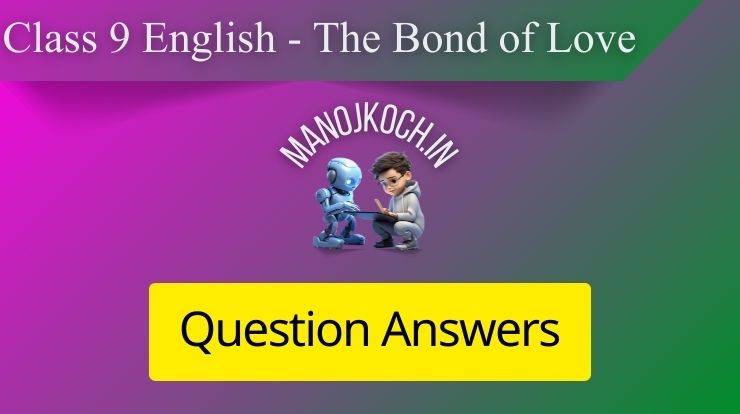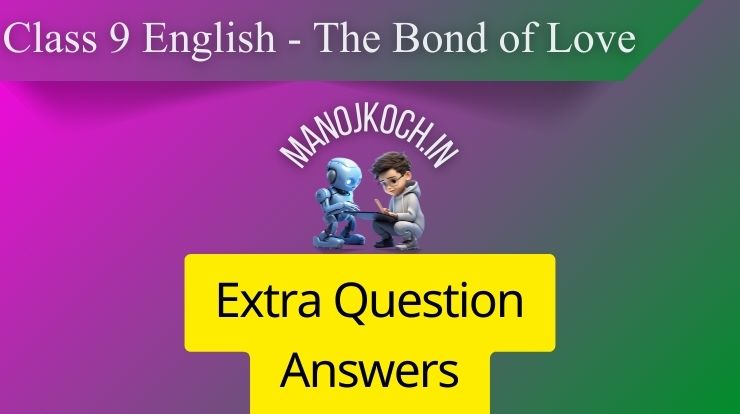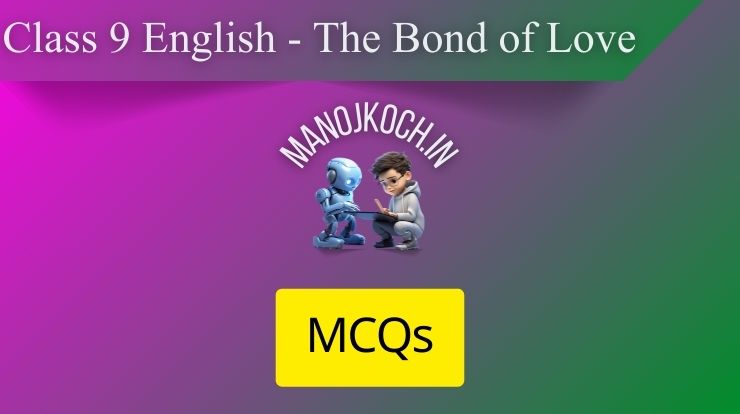Table of Contents
The Bond of Love Class 9 Questions and Answers

I. Match the Headings with Relevant Paragraphs
- An Orphaned Cub – Paragraph describing how Bruno, the bear cub, was found and rescued.
- Bruno’s Food-chart – Paragraph detailing Bruno’s eating habits and favourite foods.
- An Accidental Case of Poisoning – Paragraph about the incident where Bruno accidentally drank poison.
- Playful Baba – Paragraph showcasing Bruno’s playful nature and antics.
- Pain of Separation – Paragraph where Bruno and the family are saddened by the separation.
- Joy of Reunion – Paragraph about the emotional reunion between Bruno and the author’s wife.
- A Request to the Zoo – Paragraph where the author’s wife requests the zoo officials to allow her to bring Bruno back.
- An Island in the Courtyard – Paragraph describing the special place built for Bruno to stay safely after his return.
II. Answer the Questions
- “I got him for her by accident.”
- (i) The author, Kenneth Anderson, says this.
- (ii) ‘Him’ refers to Bruno (Baba), the bear, and ‘her’ refers to the author’s wife.
- (iii) The incident referred to is when the author accidentally found and rescued an orphaned bear cub, which he later brought home for his wife.
- “He stood on his head in delight.”
- (i) ‘He’ refers to Bruno (Baba), the bear.
- (ii) He was delighted because he was reunited with the author’s wife after being separated from her and kept in the zoo.
- “We all missed him greatly: but in a sense we were relieved.”
- (i) ‘We all’ stands for the author, his wife, and family.
- (ii) They missed Bruno (Baba), the bear.
- (iii) They felt relieved because Bruno had grown too large and difficult to manage at home, making it hard to ensure his safety and the family’s comfort.
III. Answer in 30 to 40 Words Each
- On two occasions Bruno ate/drank something that should not be eaten/drunk. What happened to him on these occasions?
- Bruno first drank some poison that was meant for the rats, which made him gravely ill, but he recovered after treatment. On another occasion, he consumed a significant amount of used engine oil, but surprisingly, it did not harm him.
- Was Bruno a loving and playful pet? Why, then, did he have to be sent away?
- Yes, Bruno was affectionate and playful. However, as he grew larger, managing him at home became challenging, and for the safety of both Bruno and the family, they decided to send him to a zoo.
- How was the problem of what to do with Bruno finally solved?
- Bruno’s problem was solved when the author’s wife arranged with the zoo officials to bring him back home. They built an island in the courtyard, providing Bruno with a secure and comfortable living space.
Thinking about Language
I. 1. Find Words with “ie” or “ei” in Them
- Field
- Friends
- Ingredients
- Height
- Mischievous
- Eighty-seven
- Relieved
- Nervous
- Piece
II. Complete with “ie” or “ei”
- Believe
- Receive
- Weird
- Leisure
- Seize
- Weight
- Reign
- Foreign
- Grief
- Price
This list follows the rule “i before e except after c” in most cases, but there are exceptions, like “weird” and “seize.”
IV. 1. The Narrative Present
The vet and I dashed back to the car. Bruno was still floundering about on his stumps, but he was weakening rapidly. He started vomiting and breathing heavily, with his flanks heaving and his mouth gaping open.
“Hold him, everybody!” someone called out. The hypodermic needle went in, and Bruno squealed as 10 c.c. of the antidote entered his system without a drop being wasted. Ten minutes later, there was no change in his condition. Another 10 c.c. of the antidote was injected. Ten minutes after that, Bruno’s breathing became less stertorous, and he was able to move his arms and legs a little, although he still couldn’t stand. Thirty minutes later, Bruno got up and had a great meal. He looked at us disdainfully, as if to say, “What’s barium carbonate to a big black bear like me?” Bruno continued eating as if nothing had happened.
In this rewrite, the sentences are in a complete narrative form, providing a clear and sequential account of the events.
2. Adverbs :
- suddenly
- wantonly
- unfortunately
- promptly
(i) Complete the sentences with suitable adverbs:
(a) Rana does her homework neatly.
(b) It rains heavily in Mumbai in June.
(c) He does his work efficiently.
(d) The dog serves his master faithfully.
(ii) Complete the sentences with the most suitable adverbs or adverbial phrases:
(a) We should never get down from a moving train.
(b) I was badly in need of support after my poor performance.
(c) Rita met with an accident. The doctor examined her immediately.
Story Reconstruction
Original Scrambled Version:
“A very hungry grasshopper saw her and said, ‘When did you get the corn? I am dying of hunger.’ She wanted to dry them. It was a cold winter’s day, and an ant was bringing out some grains of corn from her home. She had gathered the corn in summer.
‘I was singing all day,’ answered the grasshopper.
‘If you sang all summer,’ said the ant, ‘you can dance all winter.’
‘What were you doing?’ asked the ant again.
The grasshopper replied, ‘I was too busy.’
‘I collected it in summer,’ said the ant. ‘What were you doing in summer? Why did you not store some corn?'”
Reconstructed Story:
It was a cold winter’s day, and an ant was bringing out some grains of corn from her home to dry them. She had gathered the corn during the summer. A hungry grasshopper saw her and said, “When did you get the corn? I am dying of hunger.” The ant replied, “I collected it in summer. What were you doing in the summer? Why did you not store some corn?” The grasshopper replied, “I was too busy singing all day.” The ant answered, “If you sang all summer, you can dance all winter.”
Speaking: Animals and Emotions
Presentation on “Animals Also Feel the Pleasure of Love and the Pain of Separation”:
“Animals experience emotions in unique and meaningful ways. For example, dogs demonstrate deep loyalty and attachment to their owners. When my cousin went away for college, their family dog showed signs of sadness and seemed to search for him each day. Upon his return, the dog was filled with joy, running around and jumping with excitement. Animals also grieve when they lose a companion. A friend’s cat mourned her companion cat, staying close to his favourite spots and refusing to eat for days. This shows that animals, just like humans, form bonds and experience emotions like love and loss.”
Writing
Argument on Pet Care
Supporting Argument:
Pets have unique care and handling requirements, and they should be kept only by those committed to meeting these needs. Responsible pet ownership involves ensuring that pets are fed nutritious food, receive medical care, exercise, and have a safe living environment. Owners should also learn about their pets’ behaviours and health needs to prevent neglect. Pets are dependent on humans for their well-being, and only dedicated individuals can meet their physical, emotional, and social needs. Inadequate care often leads to health problems and behavioural issues in pets, making it unfair to keep them unless owners are ready to provide the necessary care.
Debate on Snake Charmers
For the Profession:
Snake charmers have a unique cultural and traditional knowledge of handling snakes. The snake charming profession is a part of India’s cultural heritage, and many charmers depend on it for their livelihood. They have an intimate understanding of snake behaviour, which allows them to educate others about snakes and help capture snakes safely from human areas. Instead of banning the practice entirely, the government could work with snake charmers to promote snake conservation, use their skills for educational purposes, and integrate them into wildlife rescue programs.
Against the Profession:
The practice of snake charming is outdated and often cruel to snakes. Many snake charmers keep the snakes in poor conditions, extracting their venom in unscientific ways and depriving them of adequate food. This leads to high mortality rates among snakes. Moreover, the profession violates the Wildlife Protection Act, which prohibits the capture and exploitation of wild animals. Instead of continuing this practice, snake charmers should be provided with alternative livelihoods and opportunities to work in conservation, using their knowledge in a way that respects animal rights and promotes biodiversity.
The Bond of Love Class 9 Extra Questions and Answers | Y4Y6P8

Extra Short Question Answers
1. Why did the ants collect corn?
Answer: The ants collected corn to store food for the winter.
2. What did the grasshopper do all summer?
Answer: The grasshopper spent the summer singing.
3. What did the ant say to the grasshopper?
Answer: The ant said, “If you sang all summer, you can dance all winter.”
4. Why did the grasshopper ask for food from the ant?
Answer: The grasshopper asked for food because he was hungry and had not prepared for winter.
5. How did the ant respond to the grasshopper’s request?
Answer: The ant refused to give the grasshopper food and reminded him to prepare for the future.
6. What lesson does the story of the grasshopper and the ant teach?
Answer: The story teaches the importance of hard work and planning ahead.
7. What was Bruno’s condition when the vet injected the antidote?
Answer: Bruno was still floundering, with heavy breathing and a gaping mouth.
8. What did the vet do to help Bruno?
Answer: The vet injected Bruno with the antidote to treat him.
9. How does the use of the present tense affect the reader in the Bruno story?
Answer: The present tense makes the story feel immediate and dramatic.
10. What is the role of an index in a book?
Answer: An index helps readers find specific topics or information by listing them alphabetically with page numbers.
Additional Questions and Answers
1. Why did the ant collect grains of corn during the summer?
Answer: The ant collected grains of corn during the summer to prepare for the winter. She knew that food would be scarce in the cold season, so she worked hard to gather and store enough to survive through the winter months.
2. What did the grasshopper do during the summer, and how did it affect him in winter?
Answer: The grasshopper spent his summer singing and enjoying himself instead of preparing for winter. As a result, he was left hungry and without food during the cold season, showing the importance of planning and hard work.
3. How does the ant’s response to the grasshopper highlight the importance of hard work?
Answer: The ant’s response to the grasshopper—“If you sang all summer, you can dance all winter”—illustrates that those who work hard and prepare for the future will be better off in difficult times, while those who are careless and do not plan may face hardships.
4. How did the ant react to the grasshopper’s request for food? What lesson does this teach?
Answer: The ant refused to give the grasshopper food and reminded him that he should have prepared for winter during the summer. This teaches the lesson that hard work and preparation are necessary for survival and success, and that irresponsibility has consequences.
5. In the story, what might the grasshopper have learned from his experience with the ant?
Answer: The grasshopper might have learned the value of planning ahead and working hard. By not preparing for winter, he faced hunger and hardship, which likely taught him that leisure without responsibility can lead to negative outcomes.
6. How does the writer create a sense of immediacy in the passage involving Bruno the bear?
Answer: The writer uses the narrative present tense and incomplete sentences to create a sense of immediacy, making the reader feel as if the events are happening in real time. This style adds drama and urgency to the situation.
7. What does the passage about Bruno the bear teach us about empathy and animal care?
Answer: The passage shows that animals require proper care and attention, especially in emergencies. It highlights the importance of empathy, quick response, and medical intervention to ensure an animal’s well-being, emphasizing that animals depend on humans for support and care.
8. Why might the author use incomplete sentences in the narration? How does it affect the reader?
Answer: The author uses incomplete sentences to heighten the sense of urgency and make the narration feel more immediate and dramatic. This style draws the reader in, making them feel as if they are part of the unfolding events.
9. How does the index help a reader find specific information in a book?
Answer: An index lists names, topics, and other details in alphabetical order, along with the pages on which they appear. This helps readers quickly locate specific information without needing to go through the entire book.
10. Why is it important to understand the unique needs of pets before deciding to keep one?
Answer: Understanding pets’ unique needs is essential because they rely on their owners for food, shelter, health care, and companionship. Failing to meet these needs can lead to health issues and behavioral problems, so only those who are prepared for the responsibility should keep pets.
The Bond of Love Class 9 MCQs | Y4Y6P8

1. Who is the narrator of the story?
a) The vet
b) Bruno
c) The writer
d) The ant
Answer: c) The writer
2. What did Bruno consume that caused him to fall ill?
a) A stick
b) Barium carbonate
c) Some grains of corn
d) A fish
Answer: b) Barium carbonate
3. Why did the grasshopper ask the ant for food?
a) The grasshopper was storing food for winter
b) The grasshopper had no food because he had not stored any for winter
c) The grasshopper wanted to help the ant
d) The grasshopper was in need of shelter
Answer: b) The grasshopper had no food because he had not stored any for winter
4. How did the ant respond to the grasshopper’s request for food?
a) Gave him food immediately
b) Refused to help and reminded the grasshopper of his failure to prepare
c) Offered the grasshopper shelter
d) Told the grasshopper to go and find his own food
Answer: b) Refused to help and reminded the grasshopper of his failure to prepare
5. What happened after Bruno was injected with the antidote?
a) Bruno died
b) Bruno remained in the same condition
c) Bruno started to recover and was able to stand after a while
d) Bruno became completely healed immediately
Answer: c) Bruno started to recover and was able to stand after a while
6. What did the grasshopper do all summer?
a) Stored food for winter
b) Played and rested
c) Sang
d) Worked hard for survival
Answer: c) Sang
7. What lesson is taught through the story of the grasshopper and the ant?
a) Laziness is rewarded in the end
b) Planning and hard work are essential for survival
c) Singing is more important than working
d) Winter is not important for survival
Answer: b) Planning and hard work are essential for survival
8. What was the first thing the vet did to treat Bruno?
a) Gave Bruno some water
b) Administered a hypodermic injection of the antidote
c) Took Bruno to a zoo
d) Did nothing at first
Answer: b) Administered a hypodermic injection of the antidote
9. How does the present tense in the Bruno’s story affect the narration?
a) It makes the story sound like a fairy tale
b) It adds a sense of immediacy and drama
c) It makes the events seem distant
d) It makes the story sound like it happened in the past
Answer: b) It adds a sense of immediacy and drama
10. In the index example from the French Revolution book, where can you find information on the Third Estate?
a) Page 404, 405
b) Page 370, 401
c) Page 489, 477
d) Page 826
Answer: a) Page 404, 405
1 thought on “The Bond of Love |Y4Y6P8|Question Answers|MCQs| Extra Q&A | PDF”